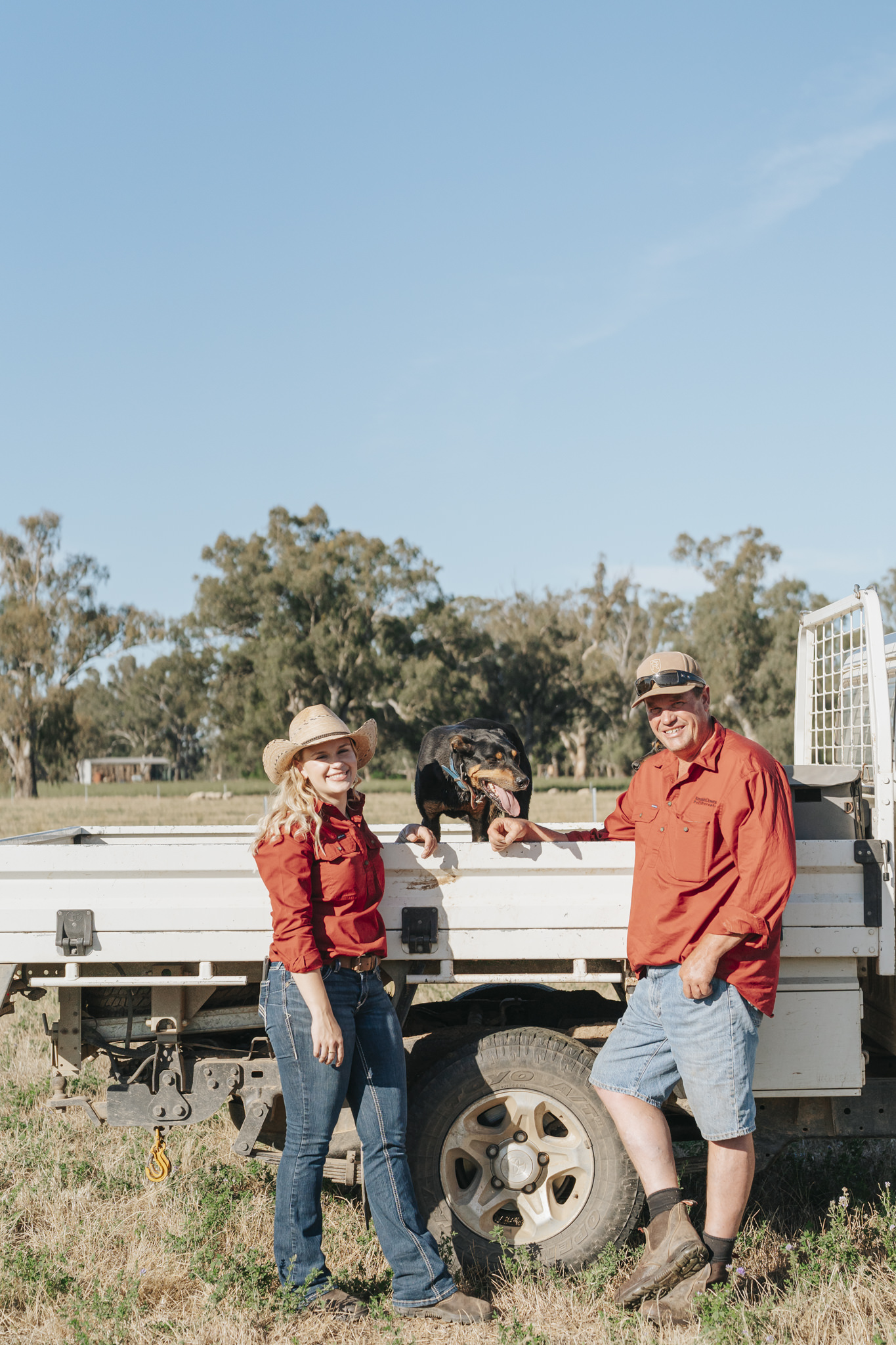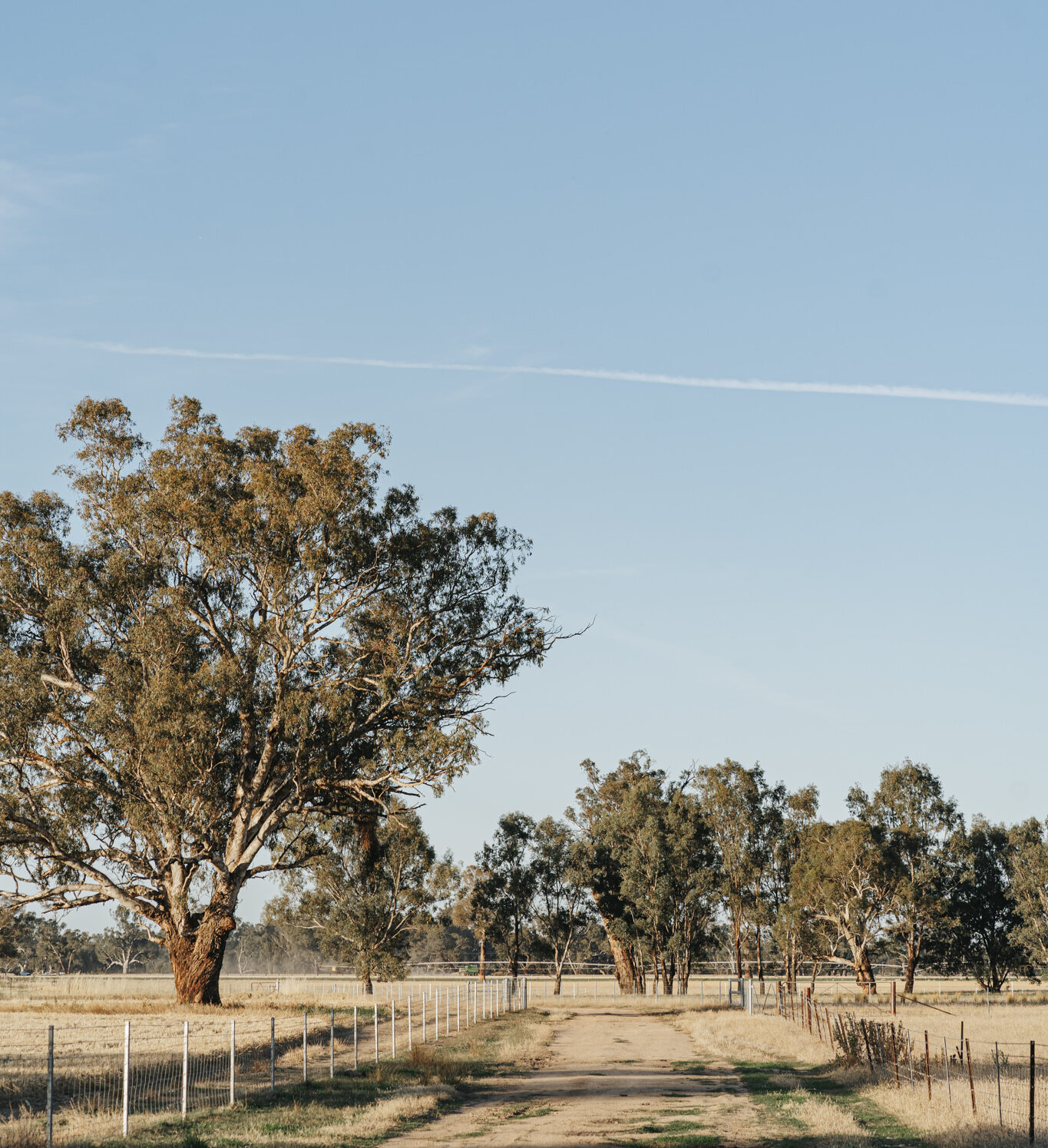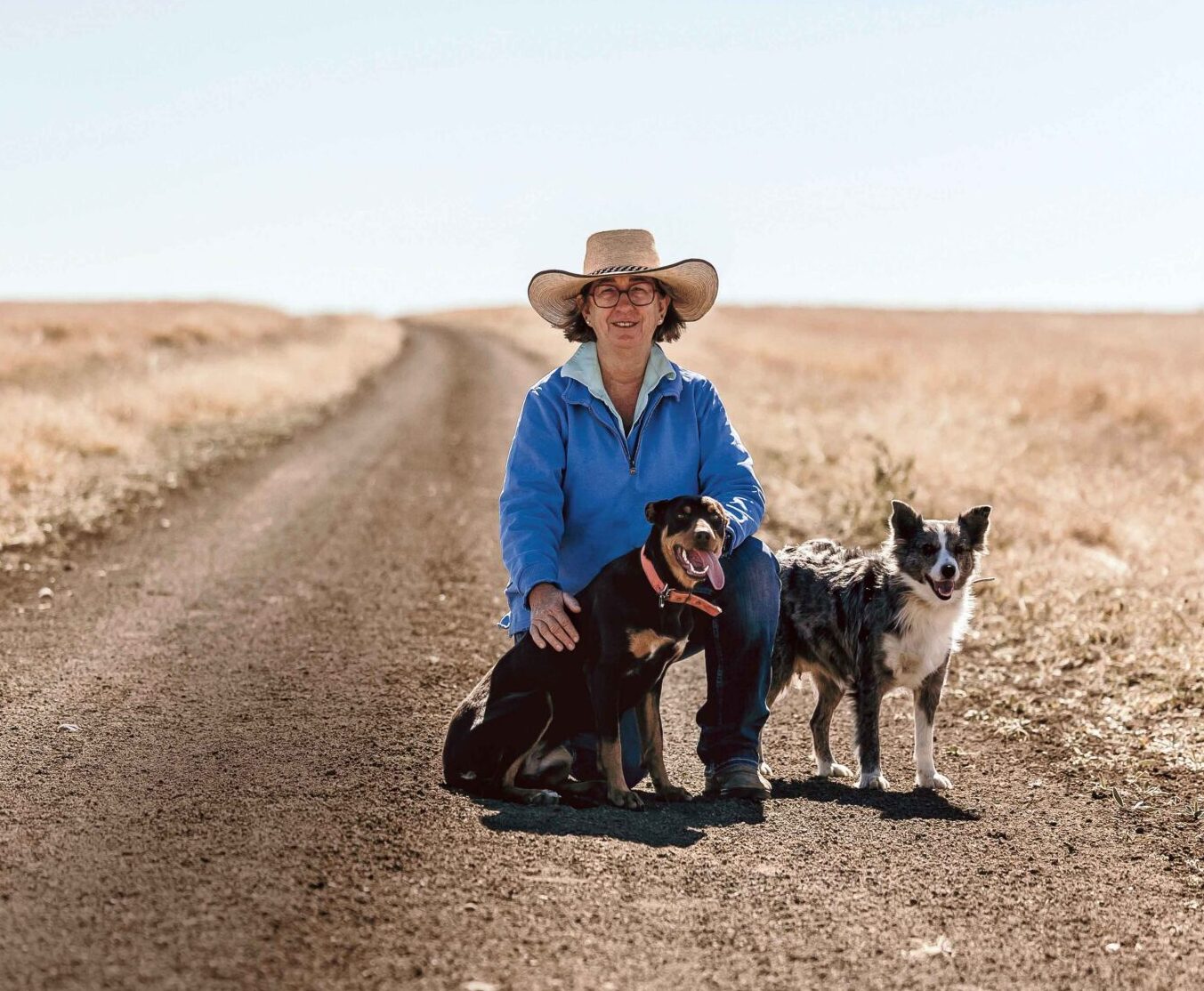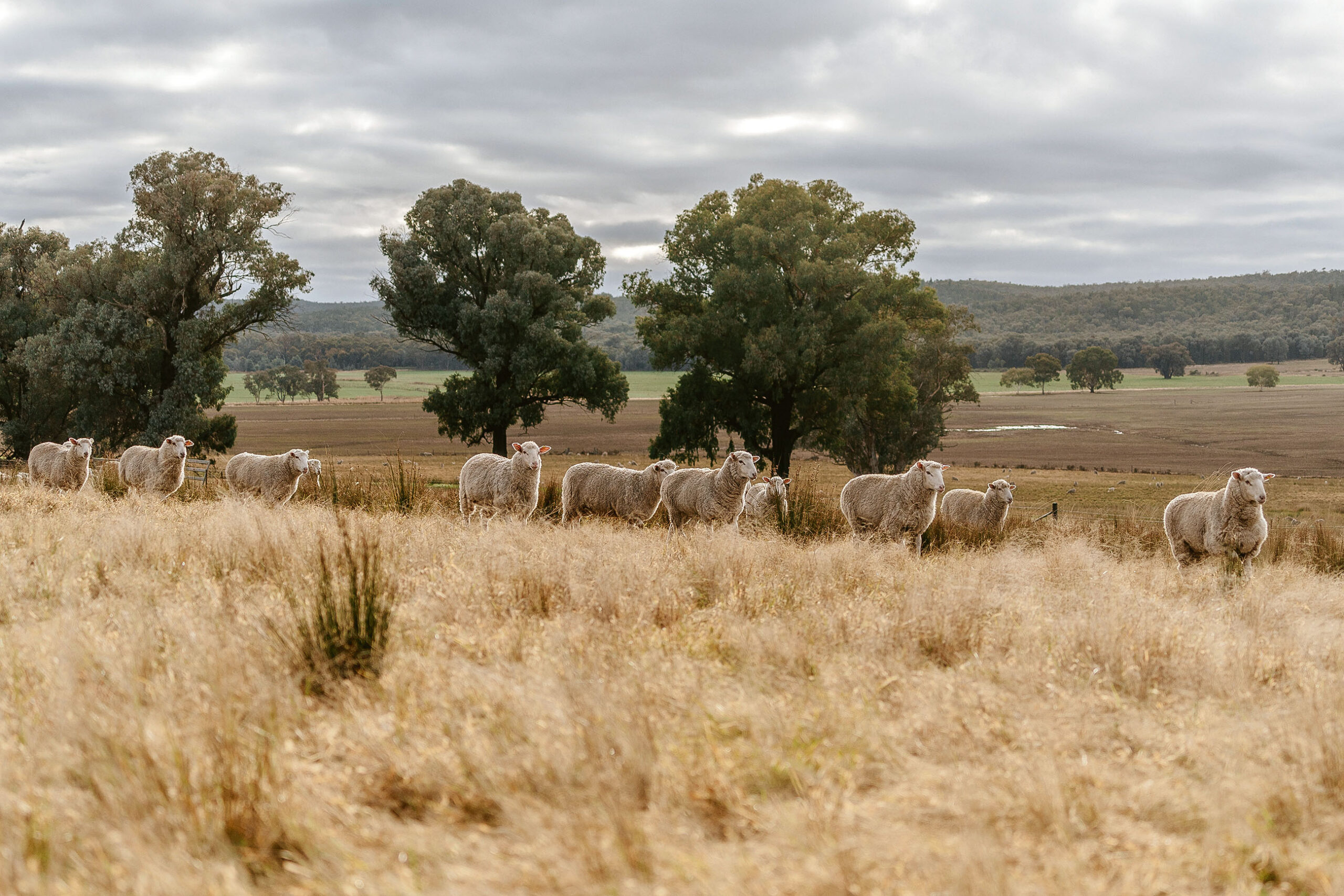Photography Alexandra MacAlpine
Young Kentish Downs poll dorset rams in the paddock at Yarragundry West.
Sign up to our mailing list for the best stories delivered to your inbox.
After completing her university studies, Holly Wilson returned to the family farm near Wagga Wagga, NSW, to help her father.
WORDS AND PHOTOGRAPHY ALEXANDRA MACALPINE
This is one of the 20-year-old’s favourite places to have a quiet moment to herself; to admire the scenery and take it all in. Cockatoos soar above, fluttering and landing among the branches and hollows of the colossal river red gums that stand as pillars along the banks.
At this time of day, the setting sun turns the bark of the gums a striking orange tone where the Murrumbidgee winds itself through the property, known as Yarragundry West. It is this scenery that reminds Holly of childhood visits, when the property was owned by her grandfather, George Wilson.
“We lived in town when I was younger. Dad worked in the merino industry as a classer and consultant. He was often on the road,” Holly explains. “I have fond memories of my school holidays visiting my grandfather at Yarragundry West as well as going on work trips with dad to the Monaro region.”
The property, 21 kilometres west of Wagga Wagga in the New South Wales Riverina, is now home to Holly, her younger brother Tom, 17, and her parents Craig and Karen. In September 2019 her parents purchased a poll dorset stud, Kentish Downs Poll Dorsets, which they also manage from Yarragundry West.
Holly is now deeply involved in the workings of the stud. But a year ago she wasn’t on the property helping with the stud’s day-to-day operations, but in Melbourne, a far cry from this home among the gum trees.
“I finished my schooling years in Wagga and a lot of my friends were from farming backgrounds. We all studied ag at school and I loved it.” After graduating as dux of The Riverina Anglican College, Holly felt she was expected to continue along an academic path. And so she did, moving from Wagga to Melbourne to commence a double degree in Law and International Politics.
“No-one was pressuring me to do that degree. But I suppose when you live in a regional town and do quite well you think, ‘Oh well, I’d better go study something big’. I did enjoy living in Melbourne, but every time I came home, I was so happy to be here and all I wanted to do was get out in the ute with Dad and help him with the stock work.”
Even when Holly was away at university, she would keep in touch with what was happening on the property and helped with the marketing of the stud. It was a way for her to stay connected. “I was halfway through the first year of my degree, and I found I was trying to force myself to enjoy it,” Holly explains.
“It took time over the summer break of 2022 to realise that all I wanted to do was come home, study agriculture and work with Dad on growing the poll dorset stud.”
Holly moved back to Wagga in March 2023. She can’t hide her joy at being back home and working with her father, and it’s a sentiment he’s more than happy to match.
“It’s unreal having Holly home,” says Craig, who has just walked in to grab a cup of tea. There’s a smile from ear to ear on his face. “Yeah, I can’t explain it. Our stud is still growing, and we’ve got to lay the groundwork. We’re like any farming enterprise. There’s so much to do here, so to have Holly home will be a huge help.” Cup of tea finished, he’s now back out the door again.
When the Wilson family bought the Kentish Downs Poll Dorsets Stud, it was operating on a property near Holbrook. They moved the stud flock to their 101 hectare property and have been focusing on expanding the breeding program. This has seen them increase their joining numbers from 440 ewes in 2019 to 1200 ewes in 2023. They hope to join 1400 in 2024. To accommodate this expansion, they leased a property across the road, providing them with an extra 161 hectares for their growing flock.
“The genetic advancement within the dorset industry is exciting,” explains Holly. “There has been a lot of technological growth and innovation within the breeding of poll dorsets, which will greatly benefit lamb producers,” she adds.
This is the side of the industry that Holly is passionate about. It’s a combination of being aware of climate change and the impact livestock can have on the environment. These two factors led her to realise the importance of data. How to record it, analyse it and incorporate it into long-term, successful livestock management practices. She hopes to be able to provide valuable and innovative data insights to new and returning clients when they come to select their rams, to ensure that they are breeding for profit and not just for the sake of breeding.

Photography Alexandra MacAlpine

Photography Alexandra MacAlpine
“The agriculture industry experiences such a varied number of adversities,” Holly adds. “The only way we can tackle these changes is by breeding the best possible animal and running them well. We hope to continue doing these types of on-farm education programs over the coming years and collaborate with other meat and livestock producers so that we can all share our knowledge and further promote the benefits of data analysis.”
For Holly, 2024 will see her take on a larger role managing the day-to-day operations of the stud. This will free Craig to focus on growing the commercial aspect of the enterprise, as well as continuing his research into implementing innovative techniques in breeding management.
The groundwork for this starts during lambing season in April, Holly’s favourite time of the year. “Lambing season is when we commence our data tracking for every ram that we breed,” says Holly. “Each day we go around on the quad bike and record every new lamb that is born. We record whether the ewe has had a single or twins, the lamb’s weight and then we tag it. It’s important for us to know what our ewes are doing and their lambing percentages so that we can look to see where we can improve.”
Holly is now starting a degree in business and agriculture at the University of New England, which she will complete remotely. This will enable her to stay at home, at Yarragundry West, where she wants to be — devoted to increasing her on-farm practical knowledge by working with her dad and connecting with other producers who share similar interests in progeny testing, data recording and genetic gain.
“To ensure longevity within the agricultural industry, we, as primary producers, need to run the most productive and profitable animals,” concludes Holly. “We can make the industry better, and that’s what I am looking forward to the most.”
Head to our subscription page to order your copy of the Graziher x Rabobank 2025 diary featuring Holly on the cover!

In her youth, she struggled to find her place. Now, Louise Martin knows exactly where she needs to be: in Tambo, Queensland, making sure rural children get the education they deserve.

Writer and photographer Alexandra MacAlpine finds ways to hold onto moments of peace amid the busyness of station life.